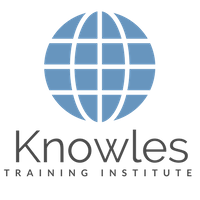Change Management Training Course in Taiwan
Our corporate training course is also available in New Taipei City, Taipei City, Kaohsiung City, Taichung City, Tainan City, Taoyuan City, Hsinchu City, Keelung City, Hualien City, Chiayi City, Changhua City, Yunlin City, Pingtung City, Taitung City, Nantou City, Miaoli City, Yilan City, Douliu City, Magong City (Penghu), Zhubei City, Fengyuan City, Zhongli City, Sanxia District, Puli Township, Jincheng Township, Banqiao District, Luodong Township, Yilan County, Hengchun Township, Daxi District, Jiufen, Sun Moon Lake, Alishan, Kenting, Danshui (Tamsui), Jiayi (Chiayi), Hsinchu City.
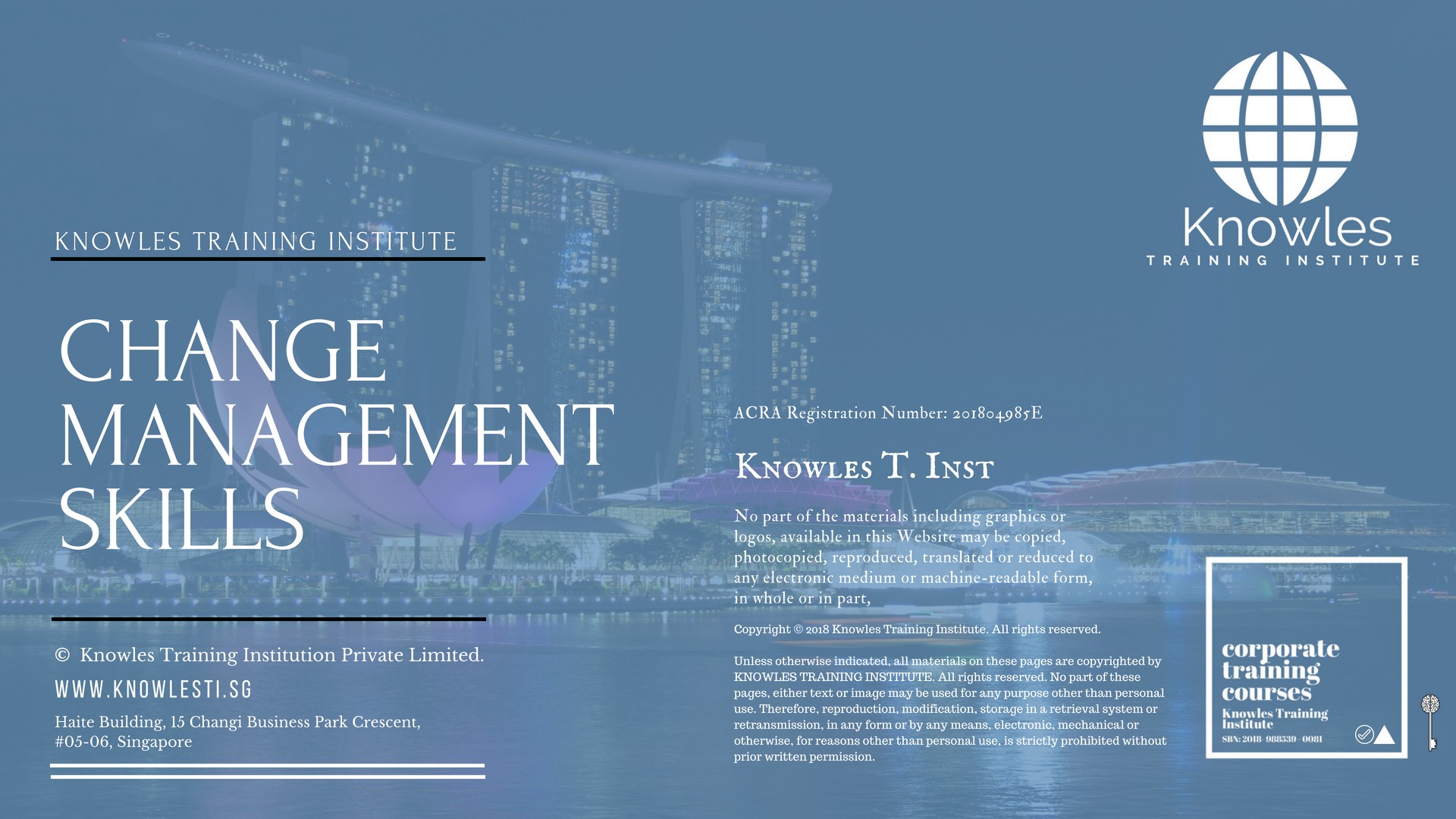
About This Change Management Training Course in Taiwan
Change Management Skills Course in Taiwan
Change management is the method used in every company undertaking a new project, implementing new policies, or intentionally conducting a change program. Any of these activities mentioned include adopting changes, be it in new working hours or new software to be implemented. Through change management, the employees impacted by change can transition successfully without any negative effects.
Change management also demands a set of skills and the right people within the organisation that can monitor the changes being experienced. In today’s fast-changing world, organisations must implement change management methods.
Who Should Attend This Change Management Training Course in Taiwan Workshop
This Change Management Skills Course in Taiwan workshop is ideal for anyone who would like to gain a strong grasp and improve their Change Management Skills.
All Staff Within An Organisation
Managers
Team Leaders
Executives
Assistants
Officers
Secretaries
Group Size For This Change Management Training Program in Taiwan
The ideal group size for this Change Management Skills course in Taiwan is:
Minimum: 5 Participants
Maximum: 15 Participants
Course Duration For This Change Management Training Course in Taiwan
The duration of this Change Management Skills Course in Taiwan workshop is 2 full days. Knowles Training Institute Taiwan will also be able to contextualised this workshop according to different durations; 3 full days, 1 day, half day, 90 minutes and 60 minutes.
2 Full Days
9 a.m to 5 p.m
Change Management Training Course in Taiwan Benefits
Below is the list of course benefits of our Change Management Skills course in Taiwan
Change Management Course in Taiwan Benefits – Part 1
• Introduces the participant to the different causes of change and how they can be managed
• Stresses the importance of change management positions in an organization during change implementations
Change Management Course in Taiwan Benefits – Part 2
• Helps the participant in undergoing personal transitions so as to increase the success of a project or program
• Increases the participant’s ability to adapt and be flexible in any situation
Change Management Course in Taiwan Benefits – Part 3
• Improves the participant’s coaching techniques in order to support those impacted by change programs
• Ensures the success of change through systematic and strategic management of the people involved and what they are going through
Change Management Training Program Objectives in Taiwan
Below is the list of course objectives of our Change Management Skills course in Taiwan
Change Management Course in Taiwan Objectives- Part 1
- State the necessary steps for preparing for a change strategy.
- State how to build support for the change.
- Explain WIFM (Individual Motivators for Change)
Change Management Course in Taiwan Objectives- Part 2
- Apply required components to develop change management and communications plans, and to list implementation procedures.
- Apply procedures for gathering data, addressing concerns and problems, evaluating options and accommodating a change direction.
Change Management Course in Taiwan Objectives- Part 3
- Employ methods for handling change project status meetings.
- State the importance of celebrating a successful change implementation, and how to share the results and benefits with people within the organisation.
- Explain the 4 states of Appreciative Inquiry, its purposes, and sample uses in case studies.
Change Management Course in Taiwan Objectives- Part 4
- Apply procedures for aligning people with a change, appealing to emotions and facts.
- Explain the benefits of resiliency in the context of change, and employ strategies the change leader and individual change participant can use to promote resiliency.
- Describe the significance of flexibility in the context of change, and describe methods the change leader and individual change participant can use to promote adaptability.
Course Content For This Change Management Skills Training Course in Taiwan
Below is the list of course content of our Change Management Skills training programme course in Taiwan
Change Management Course in Taiwan – Part 1
The definition of change is stated as “to cause to be different”. The concept of change management on a personal level has been examined for more than 100 years. But it is only after the mid-1980’s that change management has been investigated within the context of business applicability. Today’s change management initiatives have become a business discipline, driving bottom-line results through changes in systems and human behaviours. Managing change has, therefore, become a crucial skill, both for leadership — and for employees within an organisation.
- Defining Your Change Strategy
- It is critical to managing change by devising and executing a strategy that defines an approach compatible with the unique needs of the business. The change strategy serves as the guiding frame, giving direction and shaping decision making throughout the change implementation.
- Building the Change Management Team
- To efficiently administer a team positioned for success, leaders must select members who exhibit a large degree of skill such as commitment, communication and contributions. By formalising the change management team and providing funding and other sources of support, it sends a message of responsibility, accountability and demonstrates the investment the company has made in implementing the change.
Change Management Course in Taiwan – Part 2
For change to be successful, individuals within the organisation must aspire to support and participate in the change process. Solely building awareness does not create the desire within employees. Showing employees what is in it for them will provide a great starting point and help create support. The commencement of the change process is vital and showing the affected individuals how the change will enhance their environment will launch the change process on the right foot.
- What’s in it for Me?
- To reply to this question “What’s in it for Me?”, or the acronym WIFM, change management leaders within the organisation must generate energy and engagement surrounding the change.
- Building Support For The Change
- Compelling communications is required for building support in the organisation. Whoever communicates with individuals impacted by a change must have a clear comprehension of the overall nature of the change, its objectives, and how it aligns with the vision for the company. They must understand the risks of not changing, the timing for the change, and who will be most impacted by the change.
Change Management Course in Taiwan – Part 3
Change is consistent and will always transpire. Understanding change’s components on a personal level can help us relate it to a company-wide level. Change is essential to understand, as it touches many facets of a company. Its impact on the individual is of great significance as it will filter within and influence all levels of the company. Organisational change can generate fear and doubt, it is essential to understand these influences; what is required when they do occur, and planning for them when they happen.
- Influences on Change
- Typically causes of change can be classified into two classes: Internal and External. No company is an island and external powers are always influencing and communicating with its behaviour. Individuals and companies may have some minimal capability to manage such external factors such as economy, culture, politics, technology or societal changes.
- List of Common Reactions to Change
- If a change is announced, some individuals within the organisation may feel that the change is not needed. They may be reluctant to listen or debate any facts or information presented to support the change.
- Techniques to Help the Change Process
- Planning for the change is vital as with preparation comes the increment of success.
Change Management Course in Taiwan – Part 4
Every change starts with a leadership decision. Deciding to initiate changes is not always straightforward. Being prepared, planning thoroughly, and a qualified team will make that decision a lot more manageable.
- Preparing and Planning For Change
- A positive mindset is crucial. A change agent will be the anchorperson and support for the rest of the people within the organisation.
- Delegating For Change
- Surround yourself with individuals within the organisation that you can delegate to.
- Keeping the Lines of Communication Open
- It is crucial to always be available throughout the change process.
- Coping with Pushback From Change
- Not everyone in the organisation will agree on the change. Learn ways to deal with pushback
Change Management Course in Taiwan – Part 5
It is important to ensure that all stakeholders and employees within the organisation are on board with the change.
- Gathering Data For Change
- To have growing awareness and to build a desire to support the imminent change; the change management team must reach out to the company at large. The force field analysis, created by German social psychologist. Kurt Lewin. supports a change management team to recognise the advantages and disadvantages of a choice before arriving at a decision.
- Addressing Concerns and Issues of Change
- If concerns or issues occur, then measures must be taken to guarantee awareness is constantly raised and that want to support the change is amplified.
- Evaluating and Adapting
- Change is not immune to Murphy’s Law. There are various tools to help the team to make the transition smooth.
Change Management Course in Taiwan – Part 6
Once the change process is underway, it is crucial to sustaining the change with positive reinforcement.
- Leading Status Meetings During The Change Process
- The leader needs to make sure that the project and communication plan stays on track.
- Celebrating Successes
- It is important to actively celebrate the achievement with employees.
- Sharing the Results and Benefits of Change
- To maintain the result of a change, it is crucial for everyone within the organisation who is affected in the process to understand what effects are occurring.
Change Management Course in Taiwan – Part 7
Appreciative inquiry (AI) is a good model for change management. AI was developed by David L. Cooperrider, Ph.D., a professor at Case Western University. AI hypothesises that companies are not problems to be solved. Rather, each company has been created as a solution, designed in its own time, to fight a challenge, or to fill a need within a community.
- The Four Stages of Appreciative Inquiry
- The 4 stages in the appreciative Inquiry (AI) description are known as the 4-D cycle.
- The Purposes of Appreciative Inquiry
- Appreciative inquiry is administered in companies for many reasons.
- Examples and Case Studies of AI
- In the past few decades, there have been many procedures to appreciative inquiry. 2 primary methods of the appreciative inquiry often used in companies are Whole System Inquiry and the Appreciative Inquiry Summit.
Change Management Course in Taiwan – Part 8
Leadership in change management demands aligning individuals with a company’s issue or need, enabling them to see that they are working collectively toward a primary cause.
- A Dash of Emotion
- Emotion is interpreted as a state of feeling. Because the change in companies does not happen without people, human factors and emotion cannot be downplayed.
- Plenty of Facts Must Be Used
- A fact is something that is confirmed to exist or known to have existed.
Change Management Course in Taiwan – Part 9
Resiliency is the ability to consume high levels of change while preserving a level of performance and demonstrating minimal dysfunctional behavior. Resilient people do 2 things to decrease their sensitivity to dysfunctional behavior during the change process: They build their capacity to absorb shock, and they decrease the amount of energy necessary to triumphantly implement any one change.
- What is Resiliency?
- Resilience isn’t an objective characteristic; rather, it is a mixture of attributes of differing levels in characters. Resilient people, whom psychologist, Daryl Conner, terms O-Type, notice more opportunity than non-resilient personalities do.
- Why is it Important?
- When resilient personalities are faced with uncertainty, anxiety, and a loss of control that accompanies change, they tend to become more effective from the occurrences, rather than letting themselves to be absorbed bu the negative emotions.
- Five Easy Steps for the Leader and the Individual
- Individuals can exercise behaviours and steps to grow more resilient.
Change Management Course in Taiwan – Part 10
- What is Flexibility?
- There are 2 dimensions of flexibility; flexible thinking, and social flexibility.
- Why is it Important?
- Flexible personalities are team players, a critical need during a change management drive. Flexibility permits individual to brainstorm better, producing a wider variation of ideas to a project team.
- Five Easy Steps for the Leader and the Individual
- Some steps can benefit both a leader or an individual who is dealing with change on a individual or an company wide level.
Change Management Course in Taiwan Value Added Materials
Each participant will receive the following materials for the Change Management Skills course in Taiwan
Change Management Course in Taiwan Training Learner’s Guide
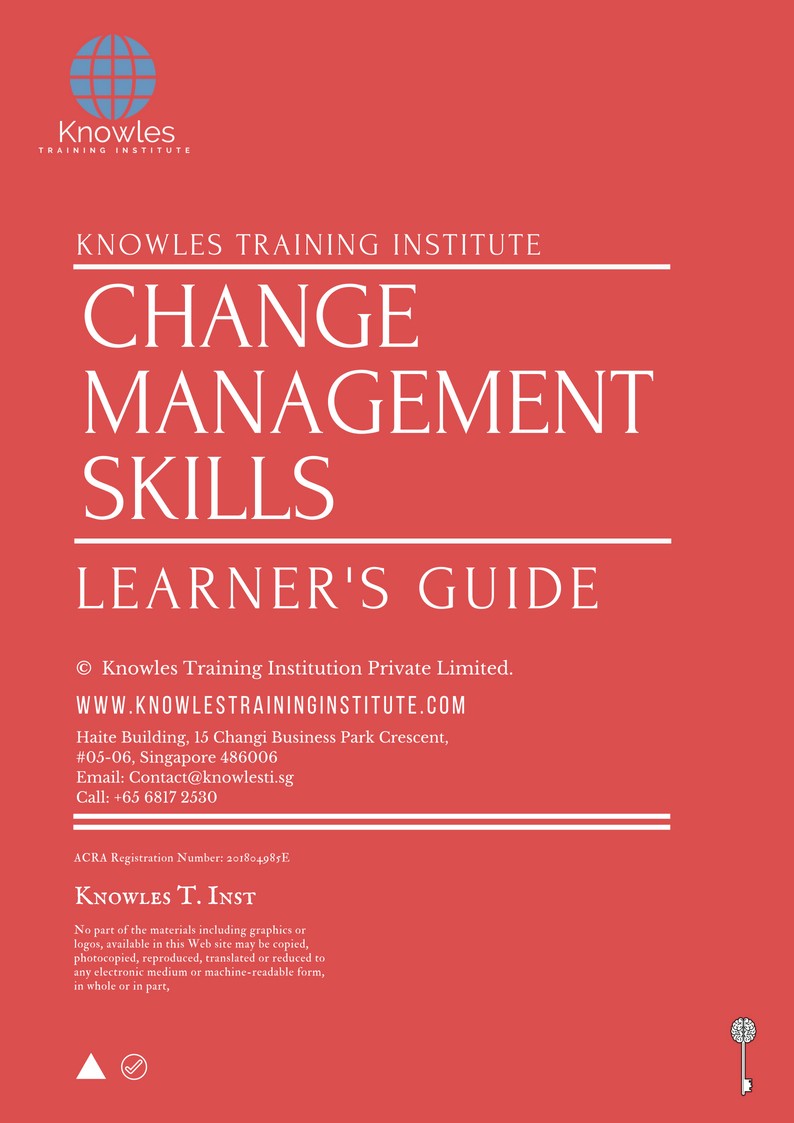
Change Management Training Course in Taiwan Handouts
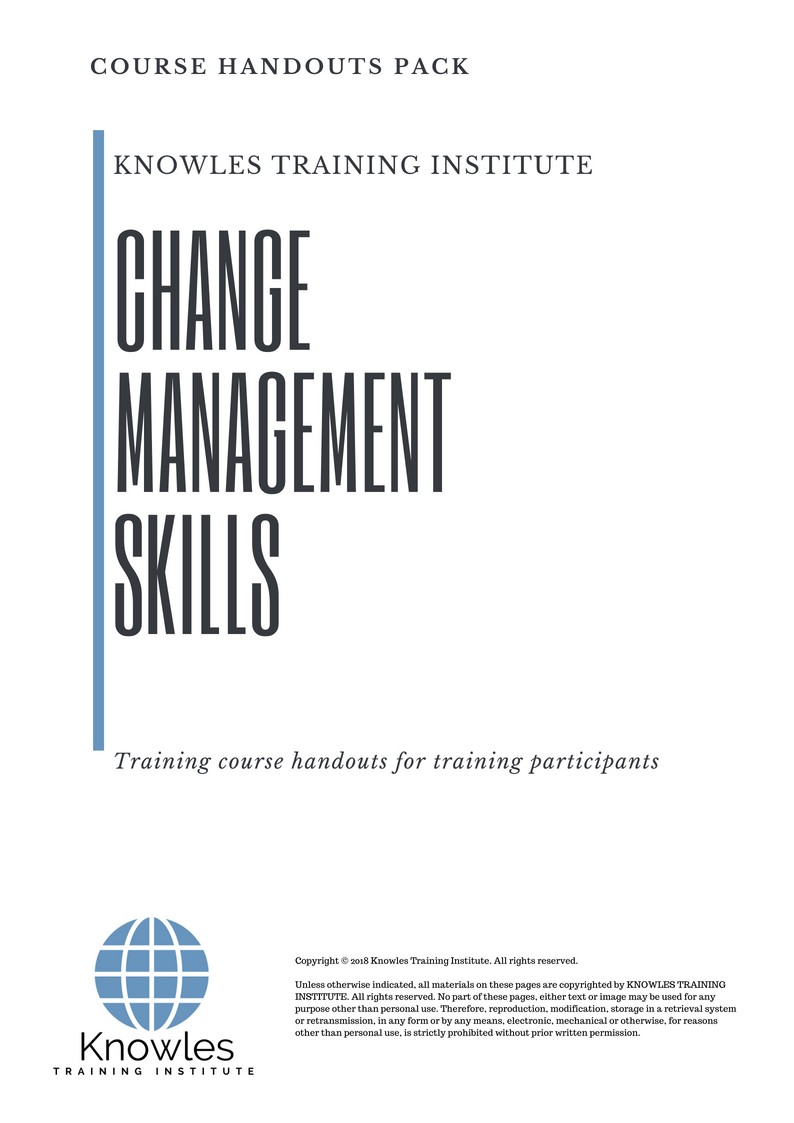
Change Management Training Course in Taiwan PPT Slides Used During Course

Change Management Course in Taiwan Certification
Each change management course in Taiwan participant will receive a certification of training completion
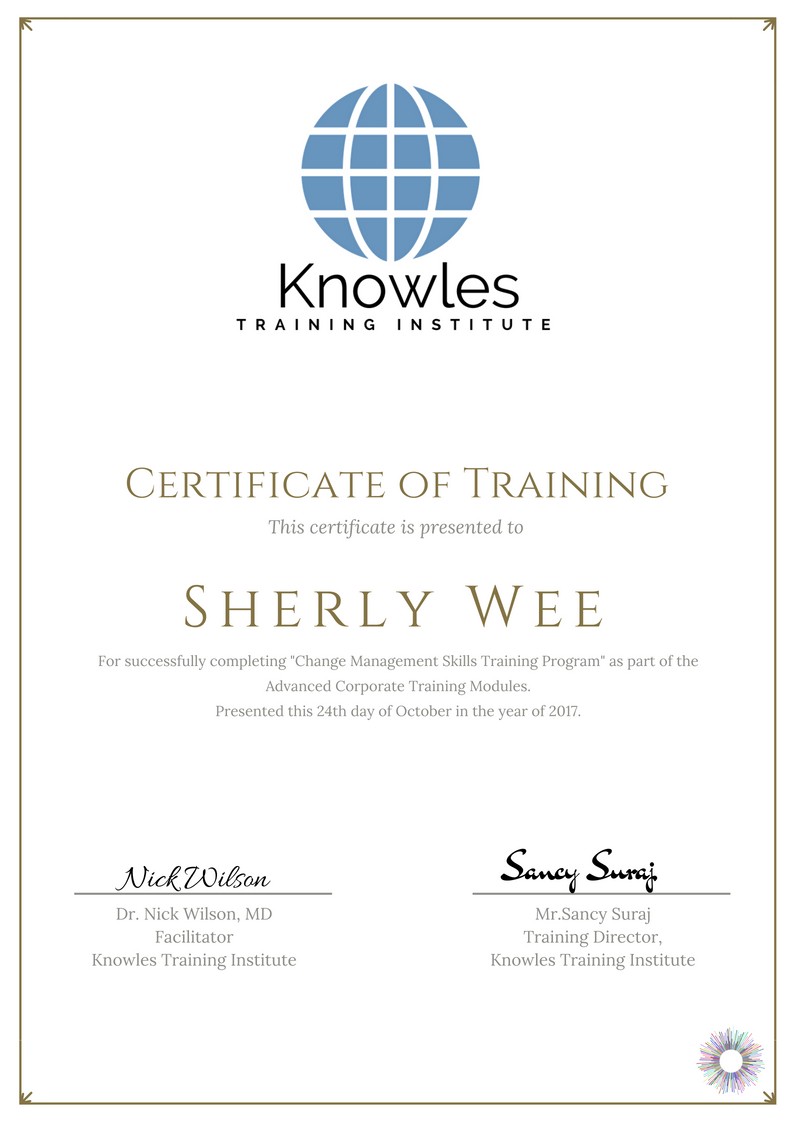
Course Fees For Change Management Skills Training Course In Taiwan
There are 4 pricing options available for this Change Management Skills training course in Taiwan. Course participants not in Taiwan may choose to sign up for our online Change Management Skills training course in Taiwan.
USD 679.97 For a 60-minute Lunch Talk Session.
USD 259.97 For a Half Day Course Per Participant.
USD 419.97 For a 1 Day Course Per Participant.
USD 569.97 For a 2 Day Course Per Participant.
- Discounts available for more than 2 participants.
Upcoming Change Management Training Course in Taiwan Schedule
Contact us for the latest Change Management Skills course in Taiwan schedules:
Email: contact@knowlesti.tw
Message:
Download Change Management Skills Course in Taiwan Brochure
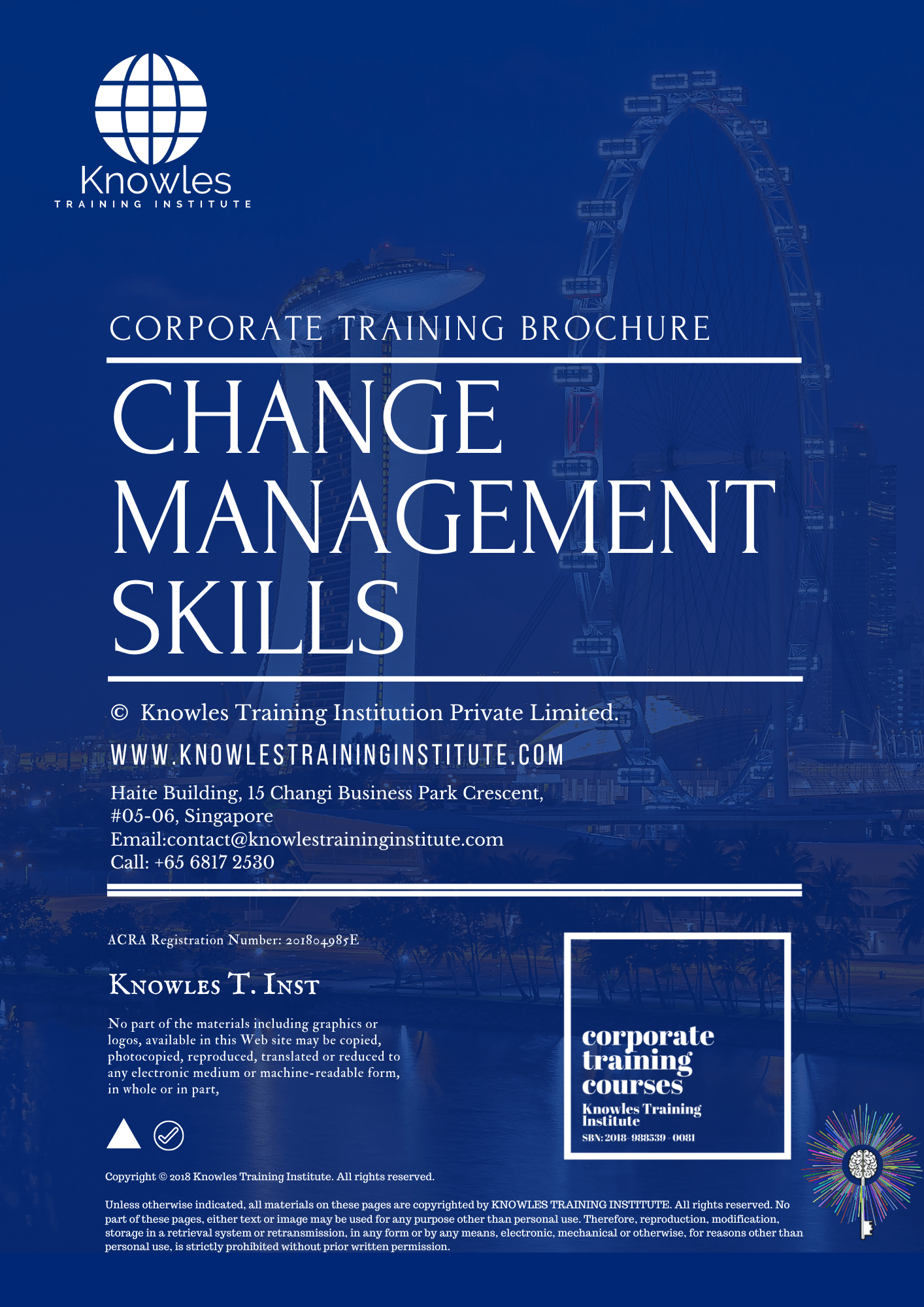
Request for this Change Management course in Taiwan brochure. Fill up the short information below and we will send it to you right away!
Post Training Support: A vast majority of training does not have any effect beyond 120 days. To work, training has to have a strong pre- and post-training component. Post-training reinforcement helps individuals to recall the understanding and ask questions.
Blended Learning: Learning does not occur in the classroom. Virtually everybody prefers distinct ways of learning. Successful learning should have a multi-channel, multi-modal strategy.
- We Understand The Industry: We’ve got a profound comprehension of the business, business design, challenges, strategy and the that our participants are in and have designed the courseware to cater to their professional needs.
- Course Content: Knowles Training Institute’s material is relevant, of high quality and provide specific learning results. Participants will leave the training course feeling as they have gained a strong understanding and will also be in a position to execute what they have learned sensibly.
Course Development — The workshop modules follow a systematic and logical arrangement. This structure helps to ensure that the course material allows the facilitators to deliver the course in a logical arrangement. Consider the subjects as building bricks into learning, our facilitators slowly build towards a comprehensive picture of this entire topic.
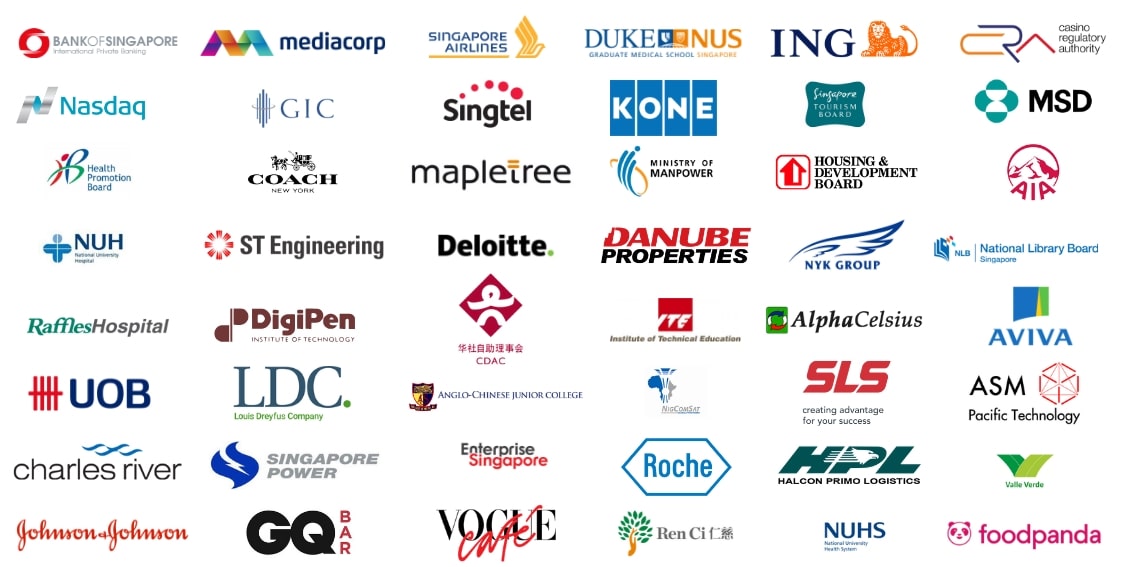

Course Enquiries
Fill up the form and we will get back to you in less than 1 working day.
Alternatively, give us a call to have one of our training consultants contact you. Our corporate training courses can be contextualized to meet your organization’s training needs. Leverage on our large pool of professional trainers and consultants for your organization’s training needs.
Email: contact@knowlesti.tw
We Guarantee 100% Privacy. We Respect Your Privacy. Your Information Will Never Be Shared.
